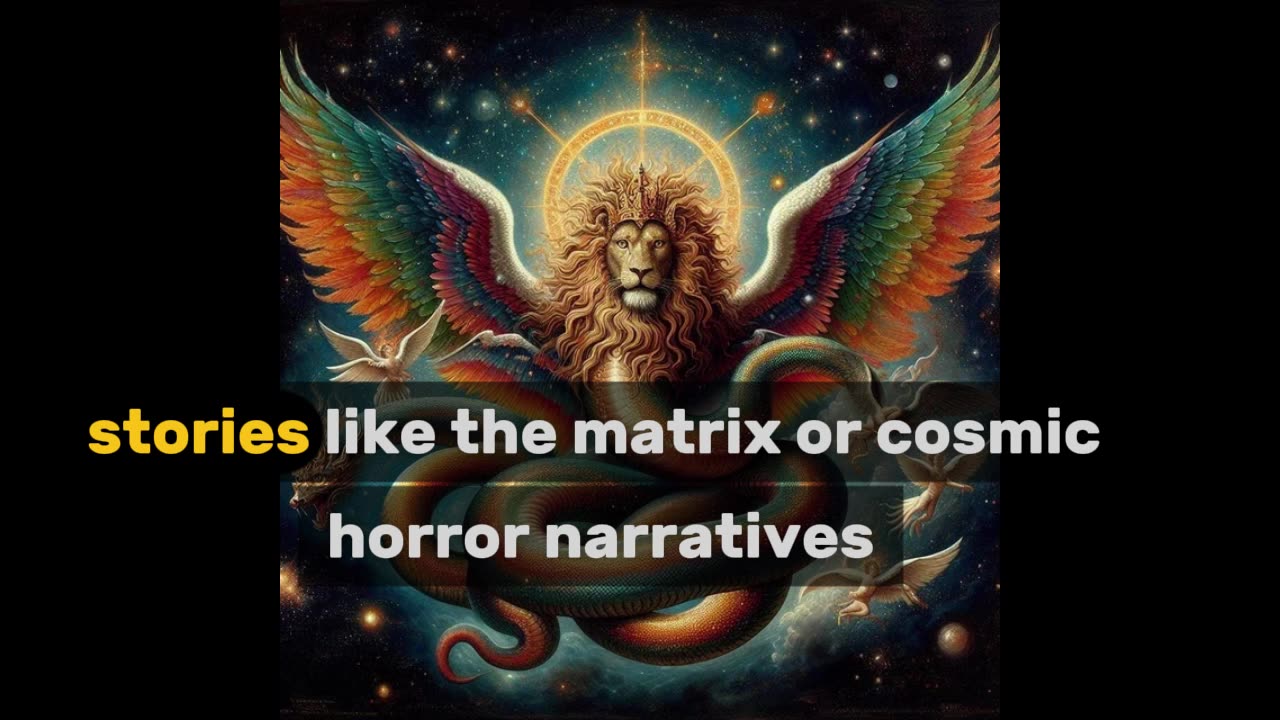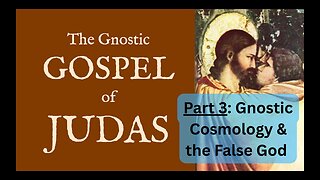Premium Only Content

Who is The Demiurge?
Who is The Demiurge?
Introduction
In Gnostic philosophy and spirituality, the Demiurge is the architect of the material world—a flawed, ignorant, and arrogant entity who stands in stark contrast to the supreme, hidden God of spiritual fullness. Far from being a benevolent creator, the Demiurge acts as a cosmic jailor, keeping souls confined within physical existence and away from their true divine origin.
The Gnostic Creation Myth
According to Gnostic tradition, everything begins in the Pleroma—the spiritual realm of perfection and light, inhabited by divine beings called Aeons. The youngest of these Aeons, Sophia (Wisdom), in an act of solitary creation and hubris, brings forth a being without her divine partner’s assent. This results in the birth of a malformed, monstrous entity: the Demiurge. Ashamed, Sophia casts him out of the Pleroma.
Isolated and ignorant of his origins, the Demiurge arrogantly believes himself to be the only god. Blind to the spiritual realities above him, he fashions the material world as a flawed, derivative replica of the true spiritual sphere. To administer his creation, the Demiurge brings forth beings called Archons—cosmic rulers that maintain the barrier between the material and spiritual worlds.
The Nature and Role of the Demiurge
Within Gnostic cosmology, the Demiurge is often identified with the Old Testament God, Yahweh. Gnostics interpret many biblical stories—especially those featuring divine jealousy or wrath—as the actions of a flawed and tyrannical creator rather than those of the true, transcendent God. The Demiurge goes by several names that reflect this nature: Yaldabaoth (“child of chaos”), Samael (“blind god”), and Saklas (“fool”)—each emphasizing his arrogance, ignorance, and spiritual blindness.
The Demiurge’s main role is to entrap the divine sparks (the true spiritual essence of humanity) within material bodies and to enforce a false reality, obscuring the knowledge (gnosis) necessary for souls to return to their original, divine home.
Comparison to Other Beliefs
This concept of the Demiurge created a sharp theological divide with mainstream Christianity. Early orthodox Christian leaders taught that God created the universe ex nihilo (out of nothing) and declared creation fundamentally good. Evil and suffering in the world, for them, were explained by human free will and sin, not by any flaw in the creator.
By contrast, Gnostics held a dualistic worldview in which the material world was evil or at best, spiritually deficient—a prison for the soul. The Demiurge (not the true God) was responsible for this condition, inverting the orthodox Christian relationship between God, creation, and salvation.
Heresy and Historical Rejection
The radical Gnostic portrayal of the Demiurge as a deeply flawed being was condemned as heresy by early church leaders, including Irenaeus of Lyon and Tertullian. To them, Gnosticism’s separation of the supreme God from the creator of the world undermined the unity, goodness, and omnipotence foundational to Christian belief. These debates defined the boundaries of Christian orthodoxy and cemented the doctrine of a singular, benevolent Creator.
The Demiurge in Modern Esoteric Thought
In modern Gnostic and esoteric circles, the Demiurge continues to symbolize the flawed nature of material reality and the human struggle for spiritual awakening. The universe, rather than being a gift from a benevolent god, is seen as a domain of limitation and ignorance. Gnosis—personal, intuitive knowledge—is the key to transcending the Demiurge’s illusions.
Practices in these traditions often aim at awakening the soul, achieving detachment from material distractions, and returning to the spiritual source.
The Demiurge in Philosophy
Philosophically, the Demiurge originated in Plato’s Timaeus as a rational craftsman shaping the cosmos—not evil, but not omnipotent or omniscient and distinct from the true source. In Gnosticism, however, he becomes the embodiment of ignorance and introduces an innovative solution to the problem of evil: the world is filled with suffering and imperfection not because of God’s will, but because it was made by a lesser being.
Psychological and Cultural Interpretations
In psychology, Carl Jung reinterpreted the Demiurge as a symbol of the unconscious forces within the psyche that structure individual reality—often in limited or problematic ways. The journey toward individuation is parallel to the Gnostic escape from the Demiurge: it requires transcending the “blind” powers within us to reach a higher consciousness.
Culturally, the Demiurge appears in science fiction and pop culture as the archetype of the flawed creator god. Stories like The Matrix or cosmic horror narratives use variations of this theme—heroes must awaken, rebel against, or escape the control of a reality designed by a limited or indifferent power. In countless novels and games, the final antagonist is not a devil, but the arrogant, controlling “god” who made or sustains a false reality.
Source: https://gnosticismexplained.org/the-gnostic-demiurge/
https://en.wikipedia.org/wiki/Demiurge
http://www.gnosis.org/library/valentinus/Demiurge.htm
-
 5:18
5:18
Doubting Tomasz 2.0
17 days agoGospel of Judas - 6 Verses on the Gnostic Cosmology and the False God
161 -
 46:09
46:09
MattMorseTV
1 hour ago🔴Bondi just DROPPED the BALL... BIG TIME.🔴
1.78K27 -
 LIVE
LIVE
SpartakusLIVE
3 hours agoCreator House LIVE STREAM || ASSUAGING the RAGE of viewers by streaming DEEP into the Night
454 watching -
 LIVE
LIVE
The Jimmy Dore Show
3 hours agoCandace Owens Faces “Credible” Assassination Threats! Massie CALLS OUT Israel-Epstein Connection!
7,405 watching -
 23:57
23:57
Jasmin Laine
5 hours agoCarney SNAPS at Reporters—MOCKS Trump and it BACKFIRES IMMEDIATELY
8838 -
 LIVE
LIVE
Sarah Westall
1 hour agoDo Near Death Experiences Provide a Glimpse into Reality? w/ Darius Wright
101 watching -
 49:36
49:36
Barry Cunningham
2 hours agoMUST SEE: PAM BONDI AND KAROLINE LEAVITT MAKE REMARKS! | AND MORE NEWS!
79.1K16 -
 41:11
41:11
Donald Trump Jr.
21 hours agoMaking America Affordable Again, Interview with Economist Steve Moore | TRIGGERED Ep.294
107K91 -
 1:02:43
1:02:43
BonginoReport
4 hours agoThe Insane Proposal That Will Ruin Elections FOREVER - Nightly Scroll w/ Hayley Caronia (Ep.184)
38.6K38 -
 16:56
16:56
T-SPLY
5 hours agoTennessee Lawmaker Running For Congress Admits To "Bullying" ICE Vehicles
2.14K5